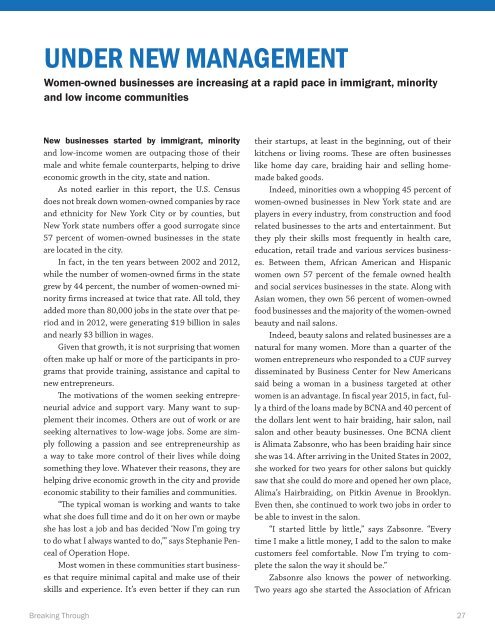BREAKING THROUGH
YWkgl
YWkgl
You also want an ePaper? Increase the reach of your titles
YUMPU automatically turns print PDFs into web optimized ePapers that Google loves.
UNDER NEW MANAGEMENT<br />
Women-owned businesses are increasing at a rapid pace in immigrant, minority<br />
and low income communities<br />
New businesses started by immigrant, minority<br />
and low-income women are outpacing those of their<br />
male and white female counterparts, helping to drive<br />
economic growth in the city, state and nation.<br />
As noted earlier in this report, the U.S. Census<br />
does not break down women-owned companies by race<br />
and ethnicity for New York City or by counties, but<br />
New York state numbers offer a good surrogate since<br />
57 percent of women-owned businesses in the state<br />
are located in the city.<br />
In fact, in the ten years between 2002 and 2012,<br />
while the number of women-owned firms in the state<br />
grew by 44 percent, the number of women-owned minority<br />
firms increased at twice that rate. All told, they<br />
added more than 80,000 jobs in the state over that period<br />
and in 2012, were generating $19 billion in sales<br />
and nearly $3 billion in wages.<br />
Given that growth, it is not surprising that women<br />
often make up half or more of the participants in programs<br />
that provide training, assistance and capital to<br />
new entrepreneurs.<br />
The motivations of the women seeking entrepreneurial<br />
advice and support vary. Many want to supplement<br />
their incomes. Others are out of work or are<br />
seeking alternatives to low-wage jobs. Some are simply<br />
following a passion and see entrepreneurship as<br />
a way to take more control of their lives while doing<br />
something they love. Whatever their reasons, they are<br />
helping drive economic growth in the city and provide<br />
economic stability to their families and communities.<br />
“The typical woman is working and wants to take<br />
what she does full time and do it on her own or maybe<br />
she has lost a job and has decided ‘Now I’m going try<br />
to do what I always wanted to do,’” says Stephanie Penceal<br />
of Operation Hope.<br />
Most women in these communities start businesses<br />
that require minimal capital and make use of their<br />
skills and experience. It’s even better if they can run<br />
their startups, at least in the beginning, out of their<br />
kitchens or living rooms. These are often businesses<br />
like home day care, braiding hair and selling homemade<br />
baked goods.<br />
Indeed, minorities own a whopping 45 percent of<br />
women-owned businesses in New York state and are<br />
players in every industry, from construction and food<br />
related businesses to the arts and entertainment. But<br />
they ply their skills most frequently in health care,<br />
education, retail trade and various services businesses.<br />
Between them, African American and Hispanic<br />
women own 57 percent of the female owned health<br />
and social services businesses in the state. Along with<br />
Asian women, they own 56 percent of women-owned<br />
food businesses and the majority of the women-owned<br />
beauty and nail salons.<br />
Indeed, beauty salons and related businesses are a<br />
natural for many women. More than a quarter of the<br />
women entrepreneurs who responded to a CUF survey<br />
disseminated by Business Center for New Americans<br />
said being a woman in a business targeted at other<br />
women is an advantage. In fiscal year 2015, in fact, fully<br />
a third of the loans made by BCNA and 40 percent of<br />
the dollars lent went to hair braiding, hair salon, nail<br />
salon and other beauty businesses. One BCNA client<br />
is Alimata Zabsonre, who has been braiding hair since<br />
she was 14. After arriving in the United States in 2002,<br />
she worked for two years for other salons but quickly<br />
saw that she could do more and opened her own place,<br />
Alima’s Hairbraiding, on Pitkin Avenue in Brooklyn.<br />
Even then, she continued to work two jobs in order to<br />
be able to invest in the salon.<br />
“I started little by little,” says Zabsonre. “Every<br />
time I make a little money, I add to the salon to make<br />
customers feel comfortable. Now I’m trying to complete<br />
the salon the way it should be.”<br />
Zabsonre also knows the power of networking.<br />
Two years ago she started the Association of African<br />
Breaking Through 27


